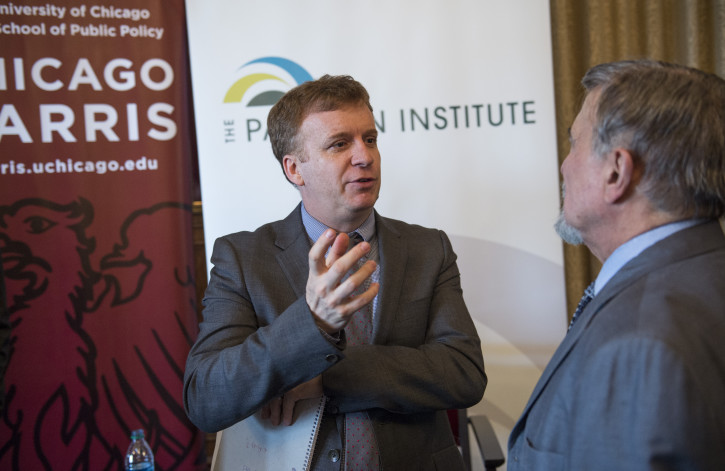
For Financial Times journalist Geoff Dyer, Chicago and China tend to go together. The first time Dyer visited the city in January 2011, he was accompanying Chinese president Hu Jintao following Hu’s state visit to Washington, DC. After an icy state dinner in at the White House—boycotted by every member of Congress—Hu arrived in Chicago, where then-mayor Richard M. Daley “rolled out the red carpet” for the Chinese delegation, recalls Dyer. This time around, Dyer was speaking at the Paulson Institute’s Contemporary China Speakers Series at the University of Chicago.
Frosty one day and warm the next—such is the eternally complex reality of the US-China relationship, with the two countries striking a balance between cooperation and competition. In his talk, Dyer focused on the primary schools of thought currently governing Western policy toward China.
 As Dyer sees it, there are the “Balancers,” or the hawkish crowd advocating for a more robust policy toward balancing China’s rise; the “Accomodationists,” guided by the “strategic reassurance” formula of reinforcing areas of common interest while directly addressing areas of mistrust; and the “Ballasts,” or those who believe the West must find new and innovative ways of working together, providing a balance against the more contentious aspects of the relationship.
As Dyer sees it, there are the “Balancers,” or the hawkish crowd advocating for a more robust policy toward balancing China’s rise; the “Accomodationists,” guided by the “strategic reassurance” formula of reinforcing areas of common interest while directly addressing areas of mistrust; and the “Ballasts,” or those who believe the West must find new and innovative ways of working together, providing a balance against the more contentious aspects of the relationship.
Dyer offered that with China asserting itself more prominently on the international scene, the US “is trying to say, we’re not going anywhere, we’re here to stay” in the Asia-Pacific arena. The US should be “standing firm” when interacting with China but should remain engaged, according to Dyer.
In fact, theorized Dyer, if the US can successfully convince China that it will not be going away in Asia—not “slinking back to Hawaii” in retreat—it will become easier for the two countries to make real progress on the “difficult” global issues that require sustained US-China cooperation. Dyer concluded that the US will first need to get its own economic house in order, so as to be able to compete internationally from a position of strength.




